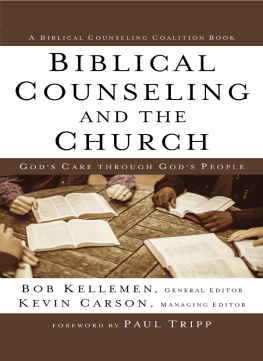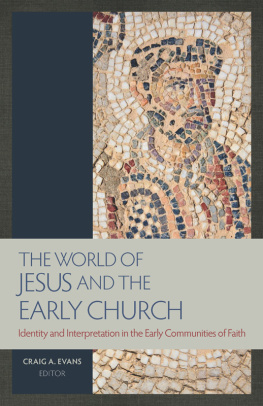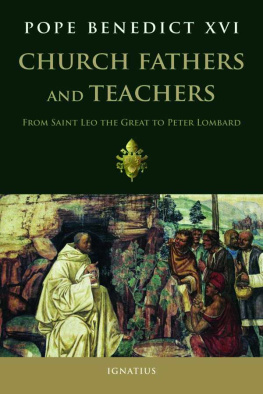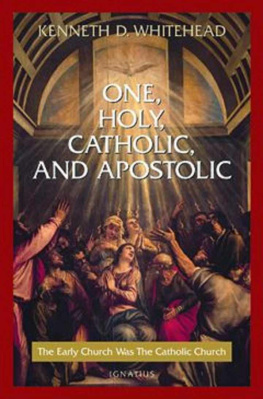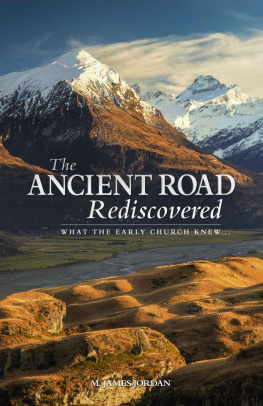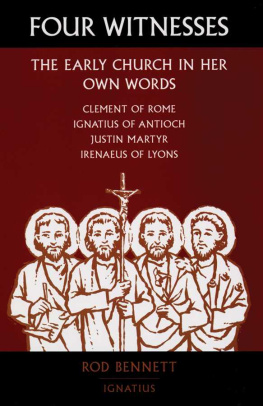D. H. Williams - Evangelicals and Tradition: The Formative Influence of the Early Church
Here you can read online D. H. Williams - Evangelicals and Tradition: The Formative Influence of the Early Church full text of the book (entire story) in english for free. Download pdf and epub, get meaning, cover and reviews about this ebook. year: 2005, publisher: Baker Publishing Group, genre: Religion. Description of the work, (preface) as well as reviews are available. Best literature library LitArk.com created for fans of good reading and offers a wide selection of genres:
Romance novel
Science fiction
Adventure
Detective
Science
History
Home and family
Prose
Art
Politics
Computer
Non-fiction
Religion
Business
Children
Humor
Choose a favorite category and find really read worthwhile books. Enjoy immersion in the world of imagination, feel the emotions of the characters or learn something new for yourself, make an fascinating discovery.

- Book:Evangelicals and Tradition: The Formative Influence of the Early Church
- Author:
- Publisher:Baker Publishing Group
- Genre:
- Year:2005
- Rating:4 / 5
- Favourites:Add to favourites
- Your mark:
- 80
- 1
- 2
- 3
- 4
- 5
Evangelicals and Tradition: The Formative Influence of the Early Church: summary, description and annotation
We offer to read an annotation, description, summary or preface (depends on what the author of the book "Evangelicals and Tradition: The Formative Influence of the Early Church" wrote himself). If you haven't found the necessary information about the book — write in the comments, we will try to find it.
D. H. Williams: author's other books
Who wrote Evangelicals and Tradition: The Formative Influence of the Early Church? Find out the surname, the name of the author of the book and a list of all author's works by series.
Evangelicals and Tradition: The Formative Influence of the Early Church — read online for free the complete book (whole text) full work
Below is the text of the book, divided by pages. System saving the place of the last page read, allows you to conveniently read the book "Evangelicals and Tradition: The Formative Influence of the Early Church" online for free, without having to search again every time where you left off. Put a bookmark, and you can go to the page where you finished reading at any time.
Font size:
Interval:
Bookmark:
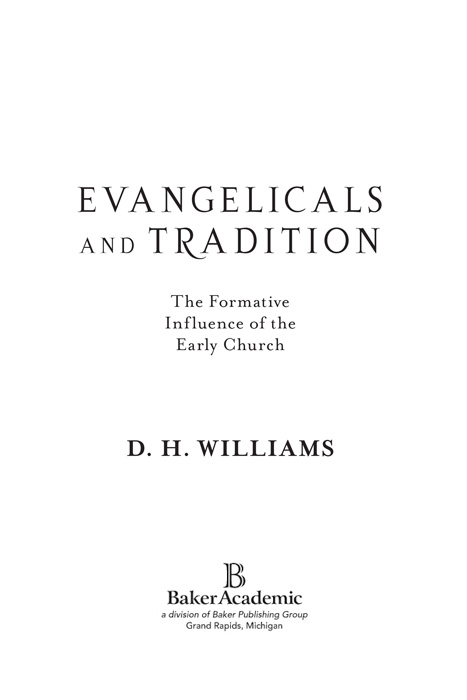
2005 by D. H. Williams
Published by Baker Academic
a division of Baker Publishing Group
P.O. Box 6287, Grand Rapids, MI 49516-6287
www.bakeracademic.com
Ebook edition created 2011
All rights reserved. No part of this publication may be reproduced, stored in a retrieval system, or transmitted in any form or by any meanselectronic, mechanical, photocopying, recording, or otherwisewithout the prior written permission of the publisher and copyright owners. The only exception is brief quotations in printed reviews.
ISBN 978-1-4412-0638-1
Library of Congress Cataloging-in-Publication Data is on file at the Library of Congress, Washington, D.C.
Unless otherwise indicated, Scripture quotations are from the Holy Bible, New International Version. NIV. Copyright 1973, 1978, 1984 by Biblica, Inc. Used by permission of Zondervan. All rights reserved worldwide. www.zondervan.com
There is a great need today to get behind the Reformers and rediscover the sources of their theology and piety. The substance of the great fathers of the church will propel evangelicals into a deeper level of theological thought and ecumenical dialogue. Evangelicals and Tradition will initiate that discussion and lead the way.
Robert Webber, Myers Professor of Ministry, Northern Seminary
In response to the pressures of modern culture, the church has dulled its message. But that message can regain its edge if evangelicals will listen to the demands of the gospel through the ears of the church fathers. Tradition used to be a fightin word for Protestants, but Williams argues that, with the proper approach, tradition can be evangelicals ally instead of their enemy.
David Neff, editor and vice president, Christianity Today
Evangelicalism is best defined as a renewal movement within historic Christian orthodoxy. This volume explores a major wellspring of that renewalthe evangelical appropriation of Christian tradition. It is an important contribution to theological ressourcement.
Timothy George, dean, Beeson Divinity School;
executive editor, Christianity Today
The Protestant Reformation began as a call for the church catholic to receive the evangelical word of Scripture. Over time, evangelical Christianity lost its sense of catholicity. Williams has emerged as one of the leading voices of this generation calling for the retrieval of the evangelical catholic heritage of the Reformation. More importantly, he shows how to integrate the retrieved tradition into the theological reflections of contemporary evangelicalism. This book deserves to be widely read and wisely practiced.
Curtis W. Freeman, research professor of theology and director,
Baptist House of Studies, Duke Divinity School
Williams has brought a new sense of engagement to the ancient task of relating Scripture, tradition, and spiritual experience. Evangelicals need to be reminded that there is a truly catholic tradition that goes back to the apostles that belongs to them as much as it does to other Christians. This book roots us in the living faith of every age and should be welcomed by everyone who wants to grow in the knowledge and love of Christ.
Gerald Bray, Anglican professor of divinity, Beeson Divinity School,
Samford University
To Cindy, Ryan, and Chad,
who came with me to a different country
and together journey still
C ONTENTS
S ERIES P REFACE
T HE E VANGELICAL R ESSOURCEMENT : Ancient Sources for the Churchs Future series is designed to address the ways in which Christians may draw upon the thought and life of the early church to respond to the challenges facing todays church. The term ressourcement was coined by French Roman Catholic writers in the mid-twentieth century as descriptive of theological renewal that declared Christians must return to the sources ( ad fontes ) of the ancient Christian tradition. The operative assumption was that the church is apostolic (formed and directed by the Old and New Testaments) and also patristic (indebted to the intellectual and spiritual legacy of the fathers of the church). Much of our understanding of the Bible and theological orthodoxy, directly or indirectly, has come through the interpretive portals of the early church, which is an integral part of the Protestant identity, no less than it is for Roman Catholicism or Eastern Orthodoxy.
Using the methods and tools of patristic scholarship, each series volume is devoted to a particular theme related to biblical and theological interpretation. Similar to the past practices of ressourcement, this series is not seeking to appropriate the contributions of the early church in an idealized sense but through a critical utilization of the fathers as the churchs primary witnesses and architects for faithfully explicating the Christian faith. Series readers will see how (1) Scripture and the early tradition were both necessary for the process of orthodox teaching, (2) there is a reciprocal relationship between theology and the life of the church, (3) the liberty of the Spirit in a believers life must be balanced with the continuity of the church in history, and (4) the Protestant Reformation must be integrated within the larger and older picture of what it means to be catholic. In effect, it is the intention of this series to reveal how historical Protestantism was inspired and shaped by the patristic church.
As Protestantism confronts the postdenominational and, in many ways, post-Christian world of the twenty-first century, it is vital that its future identity not be constructed apart from the fullness of its historical foundations. Seminal to these foundations is the inheritance of the early church, that true, genuine Christianity, directing us to the strongest evidence of the Christian doctrine (John Wesley). Therein Christians will find not a loss of their distinctiveness as Protestants but, as the sixteenth-century Reformers found, the resources necessary for presenting a uniquely Christian vision of the world and its message of redemption.
P REFACE
A FTER READING THE reviews of a previously published book, you develop a sense of which of your arguments were insightful and useful, which were probably wrong and need correction, and which ones you said too little about. Each of the three kinds of criticism are useful, but the most challenging of the three is the latter one because it reveals gaps and unfulfilled parts of your argument. For many of these insights I am grateful, and I have had the sense from nearly every reviewer that we are together engaged in a task of reenvisioning Protestantism that is not and must not be restricted by the anti-Catholic polemics of the sixteenth and seventeenth centuries (and that are still perpetuated today). It is time to move on.
My learned friend Peter Erb at Wilfrid Laurier University commented on the historical character of my book with the troubling words, At the root of his book, however, Williams cannot avoid the challenge as posited by Cardinal Newmans adage, To be deep in history is to cease to be a Protestant.Newman wrong by showing that the necessity of appropriating doctrinal history in the preservation of Christian orthodoxy is no less true for the Protestant free church than it is for any other species of Protestantism. To be deep in history for evangelical Protestantism need not be and should not be oxymoronic. One should not have to leave evangelicalism or a believers church setting to be nourished by the substantial resources available in ancient (or patristic) Christianity. The great model for this undertaking was and is Philip Schaff, whose scholarly work of the last century in producing translations of the primary texts of church history, the early church especially, is a sufficient demonstration that any oxymoron between Protestantism and the whole of the churchs history is artificially self-imposed. It is not necessarily built into the original fabric of the Protestant spirituality. This can be welcome news to many believers who wonder about the seemingly empty content and ahistoricalism of their worship services. To redress the balance, this book presents evidence that is drawn from historical and theological resources. It may bring unaccustomed exercise to some, but I hope not frustration. Frankly, the only way to discover the wellspring of patristic resources is to present them in all their diversity and uniqueness.
Next pageFont size:
Interval:
Bookmark:
Similar books «Evangelicals and Tradition: The Formative Influence of the Early Church»
Look at similar books to Evangelicals and Tradition: The Formative Influence of the Early Church. We have selected literature similar in name and meaning in the hope of providing readers with more options to find new, interesting, not yet read works.
Discussion, reviews of the book Evangelicals and Tradition: The Formative Influence of the Early Church and just readers' own opinions. Leave your comments, write what you think about the work, its meaning or the main characters. Specify what exactly you liked and what you didn't like, and why you think so.

